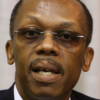Jean-Bertrand Aristide

Jean-Bertrand Aristide
Jean-Bertrand Aristideis a Haitian politician who became Haiti's first democratically elected president. A proponent of liberation theology, Aristide was appointed to a Roman Catholic parish in Port-au-Prince in 1982 after completing his studies to become a priest of the Salesian order. He became a focal point for the pro-democracy movement first under Jean-Claude "Baby Doc" Duvalier and then under the military transition regime which followed. He won the Haitian general election between 1990 and 1991, with 67% of the vote...
NationalityHaitian
ProfessionStatesman
Date of Birth15 July 1953
CountryHaiti
The future of Haiti must be linked to the respect of the rights of every single citizen.
Pa gen lape nan tet, si pa gen lape nan vant (there is no peace in the head if there is no peace in the stomach).
We have not reached the consensus that to eat is a basic human right. This is an ethical crisis. This is a crisis of faith.
As we all know, many people remain buried under tons of rubble and debris, waiting to be rescued. When we think of their suffering, we feel deeply and profoundly that we should be there, in Haiti, with them, trying our best to prevent death.
We have problems which will be addressed by Haitians.
I will work to bring peace to everyone - whatever economic level - as long as you are Haitian.
Love is the air that I breathe, like oxygen. When I lack it, I feel atrophied, asphyxiated. When I have it, I feel I am growing. And so this growth is linked to others, or to a collective other. If I realize that I do not love you, my faith diminishes, and I breathe less and less of the oxygen of life. When I feel linked to you, in communion with you, there is a current of love that passes between us, and the intensity can multiply. And the more this love grows, the more the faith becomes luminous, the more I feel linked to the collective other. I am speaking of God.
When you care about human beings, you do your best to not repress and to not let people to repress and to not arm people to repress.
I am still the only elected president of the country.
Thirty-two coups d'etat are enough.
Chopped down the tree of peace, but it will grow again.
I know how the American people care for that democratic principle. They want to see their vote respected. As we in Haiti want to see the vote of the people respected.
In 1994, when I went back to Haiti from exile, we established a Commission for Truth and Justice and Reconciliation. I passed the documents to the next government, and I never heard about it again.
Sometimes people who want to understand Haiti from a political perspective may be missing part of the picture. They also need to look at Haiti from a psychological perspective.